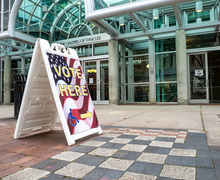Liberal : Congress must update laws concerning Internet, privacy
As Americans continue to use social media and the Internet, Congress needs to keep pace with privacy laws involved with companies online. Several news stories highlighting the abuse of social media demonstrate the need for laws to enhance security and privacy online.
In January, the European Union began debating legislation that will protect users and their data online. These new regulations are expected to become law in 2013. The United States needs to follow the EU as technology develops. Exploitation of personal data is a problem the government is not addressing.
Congress has a poor track record on legislating what happens online. The Stop Online Piracy Act was crafted as a way to stop file sharing online and protect copyrights. The act was pushed largely by the music and film industry. The bill had the potential to drastically change the way people could act online. The potential for images, music or video to be censored sparked worldwide protest. Websites like Google and Wikipedia ‘censored’ themselves or posted messages about stopping the legislation.
In the debate over SOPA, some members of Congress admitted they did not fully understand the Internet or the way some websites work. Rep. Melvin Watt (D-N.C.), a supporter of SOPA, said, ‘As one who acknowledged in his opening statement that he was not a nerd and didn’t understand a lot of the technological stuff, I’m not the person to argue about the technology part of this.’ A legislative body trying to regulate something unfamiliar will result in weak policies.
Most recently, studies have shown employers are asking potential employees for their Facebook passwords. Data that is supposed to be private is now being requested by employers. Sharing a Facebook password can be even more destructive than sharing an email password because email doesn’t always contain personal photos or friends’ contact information.
Maryland was the first state to ban employers from asking for Facebook passwords on April 11. Other states have decided to try and pass similar laws. The Department of Justice has received requests to determine if being forced to give a password to get hired is illegal.
While other states should try and extend protection to employees and users of the Internet, Congress needs to take a much more aggressive approach to legislating what happens to personal data online.
Personal data is being handed over to police when subpoenaed. On April 6, the public learned what kind of data is released when the police subpoena a Facebook account. The Boston Phoenix requested and published the package of information given to Boston police about Philip Markoff, the ‘Craigslist Killer.’ Markoff killed a woman he met on Craigslist in a hotel room in Boston in 2009. Markoff’s comments and photos were among data turned over to police.
‘Facebook has been pretty tight-lipped about the subpoena process, even refusing to acknowledge how many subpoenas they’ve served,’ according to the Phoenix article.
Online sites users are unaware of what information can be released to police. Equally unclear is how easily Facebook or Twitter distributes personal information upon request.
The United States needs to follow the EU with online privacy legislation. The EU plans to impose fines on up to 2 percent of a company’s revenue if user data is breached. Under proposed legislation, personal data like photos must be able to be transferred across social networking platforms. For example, Facebook users would be able to move their data to a Google+ account. These reforms aim to help ensure companies’ accountability and individual privacy.
If the United States does not continue to push for online regulations, the public’s privacy and data will undoubtedly be abused.
Harmen Rockler is a junior newspaper journalism and political science major. His column appears every Monday. He can be reached at horockle@syr.edu.
Published on April 15, 2012 at 12:00 pm





